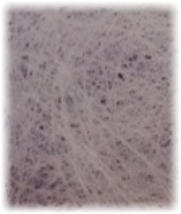Polyethylene, a dielectric plastic, exhibits the property of generating appreciable electro- static charges under the influence of an airstream. As with many other plastics, friction such as that of an airstream will cause electrostatic charges to build up on the surface of the material. Since no source of electrical energy is required to create these charges, polyethylene is properly considered self-charging. Both charges, positive and negative, will appear on the polyethylene fibers. Since airborne dust particles are by nature either negative or positive, they are strongly attracted and held by opposite charges on the polyethylene media. This electrostatic resistance greatly enhances the normal mechanical action of the filter.
under the influence of an airstream. As with many other plastics, friction such as that of an airstream will cause electrostatic charges to build up on the surface of the material. Since no source of electrical energy is required to create these charges, polyethylene is properly considered self-charging. Both charges, positive and negative, will appear on the polyethylene fibers. Since airborne dust particles are by nature either negative or positive, they are strongly attracted and held by opposite charges on the polyethylene media. This electrostatic resistance greatly enhances the normal mechanical action of the filter.
Particles in the sub-visible range (ten microns and lower) are the major cause of surface soilage and electrical circuit failure. Normal air filters do not arrest these particles and they remain airborne, causing soiling or damage to goods downstream of the filter. Control of these fines in ventilating systems is normally achieved through the use of costly filters.
The Pliotron system was found to provide economic filtration over an extremely broad range of particle sizes. The result is entirely adequate filtration performance at low cost for the majority of industrial and commercial ventilation systems.
The polyethylene media incorporated in the Pliotron air filter is inert to virtually all chemicals, fumes and acids encountered in industrial installations. The self-charging electrostatic characteristic will last the life of the filter. Filtration performance is unaffected by humidity, since extremely high surfaces resistivity is maintained up to 90% R.H.
Sample Specifications:
Air filters designed and covered by this specification shall be Pliotron type CR, permanent, electrostatic, and washable as manufactured by Pliotron Company of America, LLC Niagara Falls, New York
The filter frames shall be constructed of rust-resistant galvanized steel not less than 22 gauge.
The filter media shall be dry, woven polyethylene. Impingement filters requiring the use of oils or adhesives will not be approved.
Using the A.F.I. Test Code Procedure, the filter must be able to attain an initial air resistance efficiency of not less than 70%. Initial pressure drop must not exceed .11” WG at a face velocity of 300 F.P.M. The filter must have approval of Underwriters’ Laboratories. (Class II).